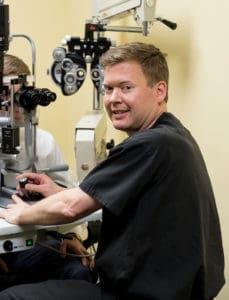How To Know If You’ve Scratched Your Cornea
The cornea is one of the most sensitive parts of the body which makes a very small corneal abrasion extremely painful. Even though it may be a tiny scratch, it can feel much larger in size and seem as if a big object is in your eye. In the eye, the top layer of the cornea is covered by a layer of cells called the corneal epithelium. An abrasion occurs when this layer is disturbed and cells are lost.
What Are the Symptoms of a Scratched Cornea
A corneal abrasion – also known as a scratched cornea or scratched eye – is one of the most common eye injuries. Scratched cornea symptoms might include significant discomfort, red eyes, tearing, blurry vision and sensitivity to light.
Anything that makes contact with the surface of the eye can cause a corneal abrasion. However, it is less common for a corneal abrasion to occur from a traumatic event like getting poked in the eye compared to everyday circumstances that lead to abrasions.
Common Causes of Corneal Abrasions:
- Makeup brushes
- Tree branches
- A pet
- Workplace debris
- Sand & dust
- Dry Eye
- Improper use of contact lenses
- Sports equipment
Dry eyes and the improper use of contact lenses can increase the risk of corneal abrasions. Those who experience dry eyes at night can actually tear the corneal epithelium when opening the eyelids because of the lack of moisture in the eye. Damaged contact lenses or wearing them too long also increases the risk of a scratched cornea.
ReVision LASIK & Cataract provides several treatment options to alleviate dry eye symptoms including Intense Pulsed Light (IPL) therapy. During IPL, concentrated light energy reduces inflammation and acts as a warm compress to restore proper function to tear-producing glands and encourage increased tear flow.
Several vision correction options are also available to allow patients to become free of contact lenses. LASIK and PRK eliminate the need for contact lenses and in turn, eliminate the risks associated with improper use.
What To Do for a Scratched Eye:
Even though it’s a natural instinct, when you feel like something is in your eye do not rub it. Rubbing your eye can make the abrasion worse. Because microorganisms can be found in tap and bottled water, it’s best to rinse your eye with a sterile saline eye wash or multipurpose contact solution. If pain, redness or other discomfort continues, see immediate attention from an eye care professional.
An optometrist or ophthalmologist will examine your eye using eye drops to numb and determine the extent of the abrasion. If an infection is possible, your eye may be swabbed for a culture.
Treatments for Corneal Abrasions:
Superficial corneal abrasions typically heal themselves within two to three days. Non-preserved lubricating eye drops may be recommended to keep the eye moist and provide more comfort during the natural healing process. In some cases, antibiotic eye drops may also be prescribed to prevent infection during healing.
For a larger or deep corneal abrasion that takes longer to heal, your doctor may use a thicker antibiotic ointment that remains in your eye and steroids to decrease inflammation and scarring. The use of a special bandage contact lens and prescription eye drops can also be used to expedite the healing of more serious abrasions.
Most corneal abrasions result in a full recovery when treated right away by a vision care professional. However, if left untreated abrasions can lead to corneal ulcers resulting in severe vision loss.
How To Prevent a Corneal Abrasion:
Taking simple, common-sense precautions can help prevent corneal abrasions. Wear safety goggles to protect your eyes while working in environments with airborne debris. This includes doing yard work, using power tools, welding and playing sports.
If wearing contacts, always follow the instructions regarding how long to wear them, when they should be discarded and the proper ways to clean the lens.
When you feel abrasions are a result of your dry eye symptoms, schedule a consultation with an eye care professional, such as those at ReVision LASIK & Cataract Surgery. They will recommend a dry eye treatment to increase good tear flow to help lubricate the eye.
Contact ReVision LASIK & Cataract Surgery for your corneal care needs. If you’d like to learn more about freeing yourself from contact lenses or our Intense Pulsed Light (IPL) therapy dry eye treatment, schedule a consultation today. Call 1-800-475-2113 or visit ReVisionEyes.com.
Share this post:


